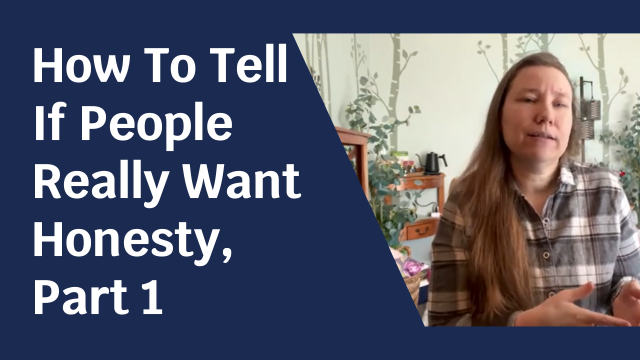
Telling the truth
A lot of Autistics I know have this experience where people tell us that they want us to be honest with them, so we tell them the truth, and then they get upset, or defensive, or deny it, or they might say, “thanks for your honesty” yet things are weird between you two later.
When that happens enough times, it can put you on your guard and teach you that people don’t really want to hear the truth, and then you’re stuck in the situation of trying to guess what the other person really wants, and that can create a lot of anxieties. This used to drive me absolutely batty because I felt like I didn’t know which way to jump.
And since I already believed that I was a bad communicator, and had had lots of experiences with other types of social social situations I didn’t understand, it just added to that belief that I’m bad at people.
When I was offering up a mask, the rejection wasn’t as personal.
As I started unmasking, I had more encounters where I was trying out actually expressing my real thoughts. Sometimes it went fine, sometimes it didn’t. But in some ways, it created a lot more internal distress than when I was masking, because it was offering up more of my authentic self, and when that was rejected, it hurt more. When I was offering up a mask, the rejection wasn’t as personal.
This led to lots of ranting and crying at my therapist (my emotions were more raw and closer to the surface than they had been in decades), yet I eventually got through the discomfort and decided that it is in fact worth it to be authentically me. That doesn’t mean I have to spew my unfiltered thoughts at every person, but when I do share, I share the truth. I share authentically.
One of the things I learned in that experience was that there are ways to tell whether someone who says that they want honesty, actually wants it or not.
The different categories
Let me clarify a little bit about what I mean by “whether they actually want it”, because there are a few layers to that.
Some people do genuinely value honesty but don’t necessarily want the full experience of it in this moment. Some think they want it but don’t like what the reality turns out to be. There are people who genuinely do want it and can handle it. And there are people who are working towards being able to handle it more, but their capacity at any given moment is inconsistent.
By the way, people can move between these categories at different times. Sometimes they have the capacity to hear the full truth and the emotional bandwidth and the energy for it, and sometimes they don’t. So it’s not an all or nothing deal, even for an individual person.
And, yes, there are also people who are at a place in their lives (possibly long-term) where they really genuinely don’t want or care for your authentic experience. But what I’ve learned is that that doesn’t necessarily say anything about you, despite what it feels like in the moment. It really does say much more about their own capacity and experiences and what they’ve gone through and are going through now.
How to tell the difference
So here are a few ways I figured out to tell the difference.
People who tend to be manipulative, toxic, or abusive are probably in the category of: they don’t actually want it, no matter what they say.
People who have unmasked extensively, and have done a lot of personal growth work, and are deeply in touch with their own authentic self, and have gotten to a point where their self-compassion is high, and their compassion for others is high, and who can handle nuance and complexity, are probably people who can, at least most of the time, have the capacity, emotional energy, and desire to deal with your authenticity and complexity.
When these people say they want the truth, they probably genuinely mean it, and they’re not going to get upset later. They’re not going to go away and think bad thoughts about you, or say that it’s all good even when it’s really not.
The complicated cases
Most people fall somewhere in the middle, where sometimes they mean it and sometimes they don’t, so it’s harder to tell whether they actually mean it this time. It can be complicated because they might genuinely mean it sometimes and not at other times, and you’re not always going to be able to tell which has the upper hand at the moment.
But that’s not your fault, because these are people who present a false sense of self in social company (which can include masking). This might be hard to hear, this is often us. I say “us,” because this applies to most people. It definitely applied to me for most of my life, and still does occasionally, but less and less so.
That’s not your fault, so you don’t have to take all of the blame for this being hard or for getting it wrong.
For people that you have a history with, it’s worth considering whether this person is someone who has a track record of saying one thing and meaning another, or getting upset even after they say that they’re not upset.
That doesn’t mean that they’re a bad person (again, most of us fall into this category), but that is more weight on the side of: if they say they want honesty, they might want only a little bit of it, but not the whole thing. Especially if they disagree with your point of view.
For new people, with whom you don’t yet have a history, it is a risk. You can’t really know as you don’t yet have enough evidence to tell. But, again, that’s not your fault, so you don’t have to take all of the blame for this being hard or for getting it wrong.
Trying to be genuine
Let’s talk for a minute about the people who are trying to live more authentically, and who value honesty in others, and yet they don’t always live up to those values.
I’m connecting people who are living authentically for themselves with people who are able to handle other peoples truth, because I believe these things are intricately linked. I think it takes inner authenticity to be able to handle other peoples’ truths. And the more that we unmask, the more that we face our own dark sides, the more that we live in integrity, the more we naturally can handle it from other people.
And doing that isn’t a linear path or instantaneous switch that flips on. It’s not something that we either do or don’t do, have or don’t have. It’s a variable and shifting and a process, and that’s deeply uncomfortable to be a part of, and to be around. Which is why a lot of people avoid it.
It’s not something that we either do or don’t do, have or don’t have. It’s a variable and shifting and a process.
I’ll tell you this quick story about when I was in my own process of unmasking. One time I was driving somewhere with a friend and she was following me in her car. After we got to our destination, I asked her for a little bit of feedback on my driving and she gave me honest feedback; my speed wasn’t always consistent and it was a little bit difficult to follow because I was speeding up and slowing down. My first reaction was to explain why.
I wasn’t trying to be defensive, I was just trying to explain that I don’t have cruise control so I wasn’t able to maintain a perfectly consistent speed, but then I noticed that she had stopped talking, and her shoulders had drooped and hunched in a little, and she was looking down, and those became clues for me. I caught myself and stopped talking.
I noticed that I asked her for feedback and then I was invalidating her response. I took a moment to think about that and then I just said to her straight out, “Hey, you know… I just asked you for feedback, and then I argued with you about the feedback that you gave me, but I really do want the feedback. So I apologize for that. What else did you have to say?”
I could notice her body language open up, she relaxed, her facial muscles softened, and she did give me one other piece of feedback. I don’t remember what that one was, but I just said “okay”, and I thought about it, and realized she was right about both things.
Learning from that
That was a really important moment for me, not because of the driving feedback, but because of the self-realization. I’ve always strongly valued honesty, even receiving honesty when it’s difficult to hear. To me, there was a clear explanation for why my speed wasn’t consistent: I don’t have cruise control in that vehicle. But that wasn’t actually the important part. The important part was our relationship in that moment.
I was able to take a step back in the middle of that conversation (not hours or days later, after ruminating on it for ages, but in real time), and I shifted my own perspective. I think that was an important moment for us in our relationship. We had been friends for years before that and we’ve remained good friends, but that’s a moment where I was one of those iffy people, who she couldn’t trust with her honesty, and I moved a little farther towards the safe people category.
It taught me (because I did reflect on it extensively after the fact) that I don’t always live up to my own ideals, but that I can, and it showed me how. Which was to focus on what she was trying to tell me, more than my response to it. That’s a really hard thing to do, and I think that’s why it’s much more common for people to stay in the defensive mode.
Moving more towards authenticity is an active state. It doesn’t just happen. That was an important milestone for me along the journey.
Moving more towards authenticity is an active state. It doesn’t just happen.
Now, when I ask for the truth, I can take it. It might be hard to hear, but I can handle difficult emotions now. And when someone asks me something, I’m going to give them an honest answer. It may not always be the full, unbridled everything. I do try to gauge what part or version of it I think is appropriate at the moment, but whatever I say, it is going to be honest.
Likewise, when I offer something to someone, it’s a genuine offer. And if they take me up on it, I’m okay with that. Because I don’t offer what I don’t mean anymore. And on the flip side of it, I don’t ask for things that I don’t need.
Okay, here’s another part of the truth. What I just said is pretty accurate, but I can’t claim that I’m perfect at this. I’m still finding bits and pieces of myself that I didn’t know I had masked until I realized something, so it might be more accurate to say that I am as honest as I know at any given moment.
Wanting honesty
So my point to all of this is that there are ways to tell, at least some of the time, whether someone actually wants honesty from you. But it takes a track record of knowing this person, and you’re not always going to have that track record. When you don’t, that’s not your personal failing if you take them at their word and it doesn’t go well.
At least for me personally, I’m past the point where I’m going to play games of trying to second guess whether people actually mean it when they say they want honesty from me. If it’s a new person, and they say they want to hear the truth: they’re gonna get it. I might give them a small portion of the truth, it doesn’t have to be an essay, but it’s going to be the truth.
I’m past the point where I’m going to play games of trying to second guess whether people actually mean it when they say they want honesty from me.
And that’s a litmus test. If they’re okay with that much truth, I’ll give them some more. And if they’re not, then I have more information about that person. It’s building a track record.
Yet in the future, I’m still going to give them the truth, but it might be in small doses, or I just not say anything. Because I’m past the point of playing the game of “what do you want to hear?” I’ve never been good with that one, and I’m so done with trying.
And maybe, if they didn’t actually want the truth, maybe it’ll teach them not to say that if they don’t really mean it.
I want to come around back around to something I mentioned at the beginning, that I had a belief that I was a bad communicator. This was one of the types of situations that created that, but what I understand now is that whether someone actually wants the truth is a really difficult thing to be able to know. It’s not just me being bad at this. A lot of people don’t even know for themselves what the real answer is. And reframing it this way helped me shed a little bit of that shame that I had built up around the belief that I’m bad at people.
Okay, I have one other thought on this, but that’s kind of its own deal, so I’m going to talk about it in the next video. I hope this has provided some insight for you, and I wish you a neurowonderful day.




